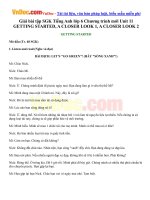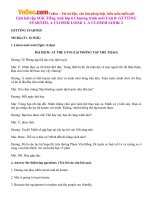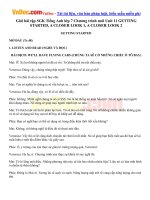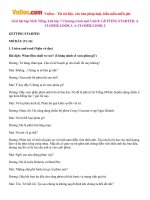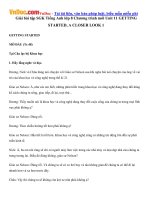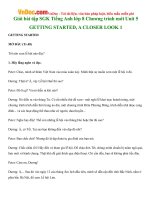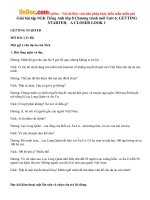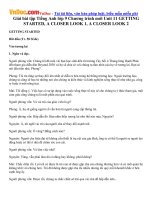Unit 11 a close look 1 English 8( 8A2)
Bạn đang xem bản rút gọn của tài liệu. Xem và tải ngay bản đầy đủ của tài liệu tại đây (338.53 KB, 20 trang )
<span class='text_page_counter'>(1)</span><div class='page_container' data-page=1>
<b>Welcome to English Class7</b>
<b>Let’s learn </b>
<b>English !</b>
<b>Let’s learn </b>
<b>English !</b>
<b>Unit 11: SCIENCE AND TECHNOLOGY</b>
<b>(A CLOSER LOOK1)</b>
<b> Nguyen Ba Loan Secondary School</b>
<b> Teacher: Vũ Đình Hùng</b>
</div>
<span class='text_page_counter'>(2)</span><div class='page_container' data-page=2>
<b>Unit 11:</b>
<b>OUR CUSTOMS AND </b>
<b>TRADITIONS</b>
</div>
<span class='text_page_counter'>(3)</span><div class='page_container' data-page=3>
<b>Unit 11: SCIENCE AND TECHNOLOGY – </b>
<b>A Close look 1</b>.
<b>Vocabulary:</b>
<b>Look out!</b>
<i><b>We add -er, -or, or -ist to a verb or noun to</b></i>
<b>form a noun indicating people.</b>
<i>Example: </i>
<i><b>- to learn → learner</b></i>
</div>
<span class='text_page_counter'>(4)</span><div class='page_container' data-page=4>
<b>• 1. A person who gives</b>
• advice is an _______.
<b>• 2. A scientist who</b>
• studies chemistry is a
• _______.
<b>• 3. A person whose job</b>
• is to design things is
• a _______.
<b>• 4. A person whose job is</b>
• writing programmes
• for computers is a
• _______.
<b>• 5. A marine _______ is a</b>
• scientist who studies
<b>Unit 11: SCIENCE AND TECHNOLOGY – </b>
<b>A Close look 1</b><b>Vocabulary:</b>
<b><sub>Complete the following sentences with nouns</sub></b></div>
<span class='text_page_counter'>(5)</span><div class='page_container' data-page=5>
<b>Unit 11: SCIENCE AND TECHNOLOGY – </b>
<b>A Close look 1</b>doctor chemist physicist
archeologist explorer engineer
</div>
<span class='text_page_counter'>(6)</span><div class='page_container' data-page=6></div>
<span class='text_page_counter'>(7)</span><div class='page_container' data-page=7></div>
<span class='text_page_counter'>(8)</span><div class='page_container' data-page=8></div>
<span class='text_page_counter'>(9)</span><div class='page_container' data-page=9></div>
<span class='text_page_counter'>(10)</span><div class='page_container' data-page=10></div>
<span class='text_page_counter'>(11)</span><div class='page_container' data-page=11></div>
<span class='text_page_counter'>(12)</span><div class='page_container' data-page=12></div>
<span class='text_page_counter'>(13)</span><div class='page_container' data-page=13>
1 . Match the first halves of the sentences (A) with the
second halves (B).
1. Although they are not
Christian, a. the first person to step into your house in the new year should be a man.
2. It's the custom b. making sponge cakes for the
Mid-Autumn Festival instead of mooncakes.
3. According to tradition, c. the tradition of living with their parents.
4. There is a tradition in our
school that d. in that country for women to get married in white.
5. They broke with tradition
by e. the family has the custom of giving presents at Christmas.
6. Many young
people do not follow f. morning exercise at 5 a.m.
7. In my family there is a
custom of doing g. girls should wear ao dai on the first day of school.
<b>e</b>
<b>d</b>
<b>a</b>
<b>g</b>
<b>b</b>
<b>c</b>
<b>f</b>
</div>
<span class='text_page_counter'>(14)</span><div class='page_container' data-page=14>
The “custome” or “tradition”could be
countable
or
uncountable
.
1. Although they are not Christian, the family has the custom of
giving presents at Christmas.
2. It's the custom, in that country for women to get married in
white.
3. According to tradition, the first person to step into your house in
the new year should be a man.
4. There is a tradition in our school that, girls should wear ao dai on
the first day of school.
5. They broke with tradition by making sponge cakes for the
Mid-Autumn Festival instead of mooncakes
6. Many young people do not follow the tradition of living with
their parents
</div>
<span class='text_page_counter'>(15)</span><div class='page_container' data-page=15>
2. Read the full sentences in 1 again and complete the
expressions below.
1. it's the ... For somebody to do
something.
2. there's a ... that + clause
3. ... ...to tradition, + clause
4. follow the ... of doing something
5. break ... tradition by doing
something
6. have the custom ... doing something
7. there is a custom of ... something
custom
tradition
According
tradition
with
of
doing
</div>
<span class='text_page_counter'>(16)</span><div class='page_container' data-page=16>
3. Read the following customs and traditions. Make
sentences to say if you have these in your province or
area, using the expressions in 2. Remember to change
the verb tense if necessary.
.
According to tradition,
we have fireworks on
New Year's Eve.
My area broke with
tradition by not having
firecrackers, on New
Year's Eve
My area broke with
tradition by not having
firecrackers, on New
Year's Eve
There's a tradition in our
province of having fireworks
on New Year's Eve.)
There's a tradition in our
province of having fireworks
on New Year's Eve.)
<b>Unit 4: OUR CUSTOMS AND TRADITIONS – </b>
<b>A Close look 1</b></div>
<span class='text_page_counter'>(17)</span><div class='page_container' data-page=17>
.
1. Having firework on New Year’s Eve
2. Waiting until the guess finish eating before leaving
the dinner table.
3. Touching children’s head
4. Decorating the house on special occasion.
5. Women shaking stranger’s hand
1. Having firework on New Year’s Eve
2. Waiting until the guess finish eating before leaving
the dinner table.
3. Touching children’s head
4. Decorating the house on special occasion.
5. Women shaking stranger’s hand
4. Now complete the following sentences with your own ideas
1.It’s the custom in my country that...
2.We broke with tradition by ...
3.There is a tradition in my family that ...
4.We have a custom of ...
5.According to tradition, ....
1.It’s the custom in my country that...
2.We broke with tradition by ...
3.There is a tradition in my family that ...
4.We have a custom of ...
5.According to tradition, ....
</div>
<span class='text_page_counter'>(18)</span><div class='page_container' data-page=18>
<b>PRONUCIATION</b>
5.Complete the words under the pictures with spr or str. Then listen and
repeat.
<b>Cluster: /spr / and / str/</b>
espresso
str
spr
astronaunt
str
spray
spr
spr
</div>
<span class='text_page_counter'>(19)</span><div class='page_container' data-page=19>
6. Listen and circle the words with /spr/ and underline the
words with /str/. Then say the sentences.
1.In my family, all the traditions of our ancestors
are strictly followed.
2.The custom of saying hello to strangers has spread
through our community.
3.In our district, it's the custom for residents to
sweep the streets on Saturday mornings.
4.That filmstrip really highlighted our customs and
traditions.
5.Parents usually want their offspring to follow the
family traditions.
</div>
<span class='text_page_counter'>(20)</span><div class='page_container' data-page=20>
<b>* Homework:</b>
- Learn vocabulary by heart and
rewrite them in sentences.
- Redo the exercise in your notebook.
- Prepare for a closer look 2
</div>
<!--links-->

